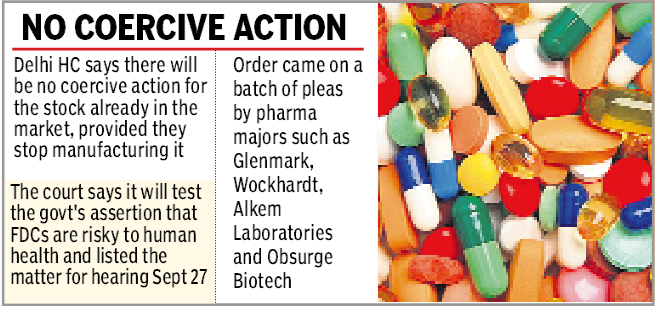New Delhi: Pharma firms which challenged the Centre’s decision to ban 328 fixed dose combination (FDC) drugs were Tuesday protected by the Delhi High Court from coercive action against them for the stock already in the market, provided they stop manufacturing the prohibited medicines.
Justice Vibhu Bakhru said the interim order would apply to the companies which have moved the high court and directed the health ministry to file an affidavit indicating the reasons for prohibiting manufacture and sale of the FDCs.
The court said it will test the government’s assertion that the FDCs were risky to human health and listed the matter for further hearing September 27. It also asked the companies to give the batch numbers of the stock in the market. The order came on a batch of pleas by several pharma majors including Glenmark, Wockhardt, Alkem Laboratories and Obsurge Biotech, challenging the health ministry’s September 7 ban on 328 FDCs, which are two or more drugs combined in a fixed ratio into a single dosage form.
Coral Laboratories, Lupin, Mankind Pharma, Koye Pharmaceuticals, Macleods and Laborate have also moved the high court against the ban on their FDCs ranging from anti-inflammatory and pain killers to antibiotics and drugs for treating bacterial infections.
In a statement, Khaitan and co-partner Ajay Bhargava, who represented Glenmark, Lupin, Mankind, Coral and Koye, said: “The order will bring some respite to the pharma companies to protect them against coercive measures by the government in relation to the medicines which are already manufactured and in the distribution channel.”
The court issued notice on each company’s plea and sought the Centre’s response by the next date of hearing, September 27. Wockhardt had got the interim order in its favour on September 14 in respect of its anti-inflammatory medicine — Ace Proxyvon and this relief was extended till the next date by the court.
Alkem moved the high court in respect of the ban on its anti-bacterial medicine Taxim and a painkiller which is a combination of the drugs diclofenac and paracetamol. Apart from that Glenmark has challenged the ban on four of its FDCs — two antibiotics, an ear drop and two anti-bacterial/antifungal medicines.
The court asked the ministry to file an affidavit indicating that the drug combination of each FDC was given in different dosages and they are not required to be taken together as part of one tablet or cream.
The Supreme Court had yesterday allowed sale of Piramal Healthcare’s Saridon, GlaxoSmithKline’s Piriton, Juggat Pharma’s Dart and another drug.






































